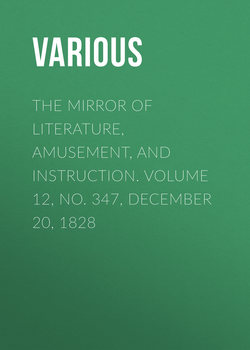The Mirror of Literature, Amusement, and Instruction. Volume 12, No. 347, December 20, 1828

Реклама. ООО «ЛитРес», ИНН: 7719571260.
Оглавление
Various. The Mirror of Literature, Amusement, and Instruction. Volume 12, No. 347, December 20, 1828
EUROPEAN CITIES.—NAPLES
LEICESTER ABBEY.—DEATH OF CARDINAL WOLSEY
ANCIENT OATHS
SONNET
THE DEATH OF SALADIN.9
BANQUETTING HOUSE, WHITEHALL
P.T.W. THE UNIVERSE
THE SKETCH BOOK
COLLEGE LOVE
MANNERS AND CUSTOMS OF ALL NATIONS
CHRISTMAS CUSTOMS IN THE NETHERLANDS
THE JEWS
EGYPTIAN RATIONS
COLUMN IN BLENHEIM PARK
THE SELECTOR AND LITERARY NOTICES OF NEW WORKS
MEMOIRS OF VIDOCQ
THE ANECDOTE GALLERY
WHITFIELD
SIR RICHARD JEBB
THE GATHERER
GOOD BYE
IMMORTALITY
LINES TO A LADY, ON HER REFUSING HER CARD
Отрывок из книги
(For the Mirror.)
Few periods of English history are more pregnant with events, or more interesting to the antiquary, and general reader, than that which comprised the fortunes of Wolsey. The eventful life of the Cardinal, checkered as it was by the vicissitudes of fortune, his sudden elevation, and finally his more sudden fall and death, display an appalling picture of "the instability of human affairs." This prelate and statesman, who even aspired to the Papal throne itself, "was an honest poore man's sonne in the towne of Ipswiche,"1 who having received a good education, and being endowed with great capacity, soon rose to fill the highest offices of the church and state; in 1515 he was created Lord High Chancellor, and in three years afterwards was appointed legate à latere by the Pope, having previously received a Cardinal's cap.
.....
It will be recollected, that in a former volume I gave you the form of the oath taken by the appellee in the ancient manner of trial by battle. The appellee, when appealed of felony, pleads not guilty and throws down his glove, and declares he will defend the same by his body; the appellant takes up the glove, and replies that he is ready to make good the appeal body for body; and thereupon the appellee, taking the book in his right hand, makes oath as before mentioned. To which the appellant replies, holding the Bible and his antagonist's hand in the same manner as the other, "Hear this, O man, whom I hold by the hand, who callest thyself Thomas by the name of baptism, that thou art perjured; and therefore perjured, because that thou feloniously didst murder my father, William by name. So help me God and the Saints, and this I will prove against thee by my body, as this court shall award." And then the combat proceeds.
There is a striking resemblance between this process and that of the court of Arcopagus, at Athens, for murder, where the prisoner and prosecutor were both sworn in the most solemn manner—the prosecutor, that he was related to the deceased, (for none but near relations were permitted to prosecute in that court,) and that the prisoner was the cause of his death; the prisoner, that he was innocent of the charge against him.
.....